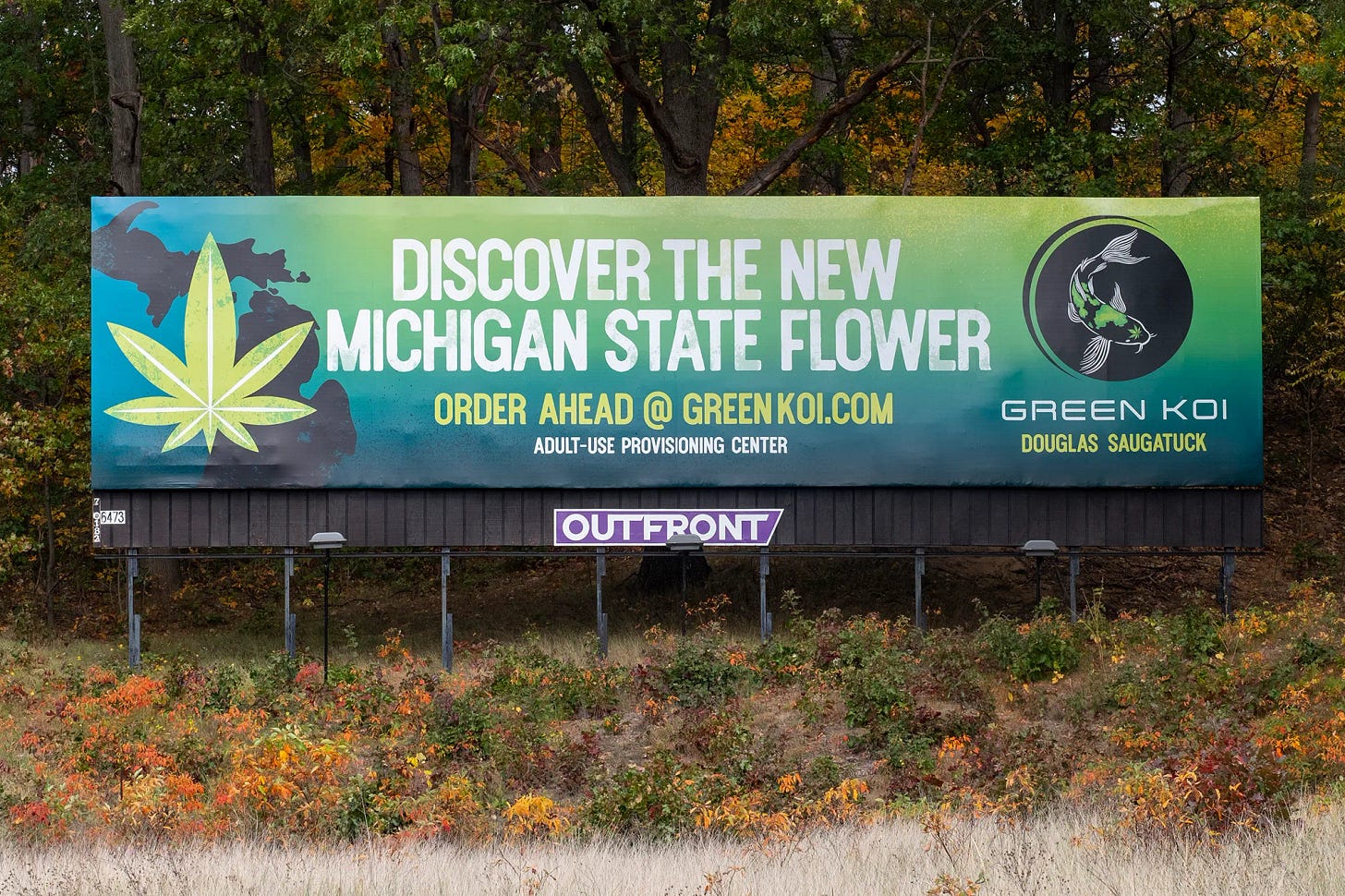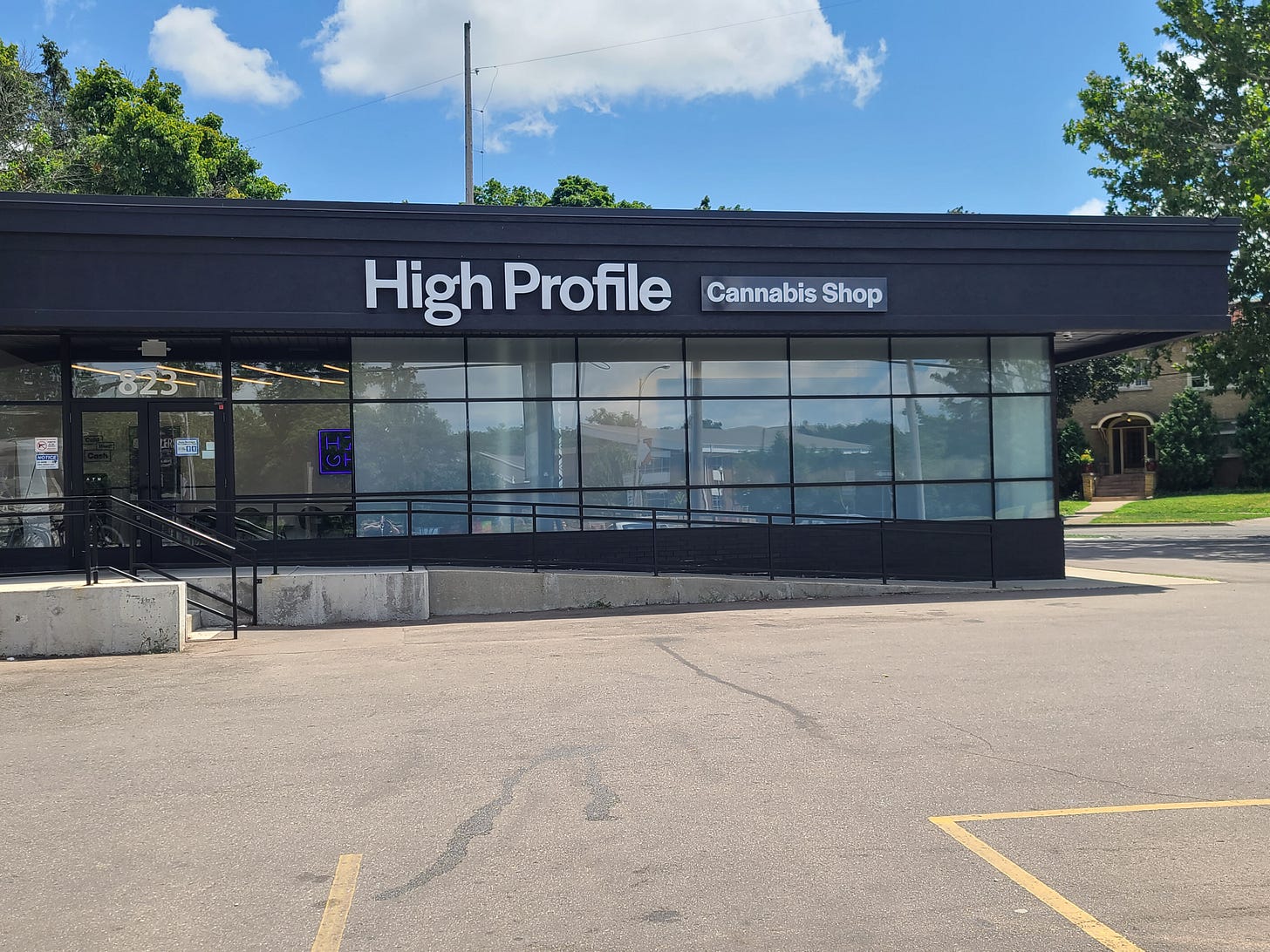Dear Readers,
The long weekend in Michigan was perfect. That stage of autumn when the few remaining leaves fall slowly, leisurely, as if each were waiting its turn. One . . . then another . . . then another . . . floating, twisting. It was mesmerizing.
How about a 17th century poem?
On a withered branch
A crow is perched,
In the autumn evening.
(Basho)
Here’s one from this morning:
Do we have to go back to work? I suppose we do, In a little while. (Campos)
Not quite Basho.
Anyway, Michigan was great. Also, weed is everywhere around there. At least the signs of it. Literally the signs. Like the billboards on the highway. After a few miles on the freeway you get the feeling there are just three industries in Michigan these days: weed, booze, and gambling. Though there’s also a fair amount of sex—strip clubs, massage parlors, etc.
Driving through Battle Creek the view looks more or less like this: Sign for weed. Sign for gambling. Sign for strip club. Huge casino. Sign for weed. Sign for gambling. And so on.

Is this what the eminent historian David Courtwright meant when he coined the term “Limbic Capitalism”? Here’s Courtwright:
Limbic capitalism refers to a technologically advanced but socially regressive business system in which global industries, often with the help of complicit governments and criminal organizations, encourage excessive consumption and addiction. They do so by targeting the [brain’s] limbic system . . . The limbic system’s pathways of networked neurons make possible pleasure, motivation, long-term memory, and other emotionally linked functions crucial for survival. Paradoxically, these same neural circuits make possible profits from activities that work against survival, businesses having turned evolution’s handiwork to their own ends.
That’s from Courtwright’s excellent book The Age of Addiction. I recommend it.
There are definitely a lot of limbic systems being targeted in Michigan these days. Though in some ways it’s been a long time coming. I remember when I first heard the word “microbrewery.” It was the mid-1980s, and one of my brother’s friends worked at this little place downtown that brewed its own beer. This was something highly exotic at the time. That place, which amounted to a small tasting room with a ping-pong table, was called the Kalamazoo Brewing Company. It later changed its name to “Bell’s.” You’re probably familiar. In 2021, Larry Bell sold his wildly successful company to the Australian firm “Lion” for what was surely an enormous sum.

I hear the company gave some pretty sweet bonuses to their employees as a result of the sale, and that some of those bonuses went to very good use. I’m specifically aware of at least one family vacation to Europe. And downtown Kalamazoo has certainly had a renaissance over the last few decades, with the ever-expanding Bell’s and its national reputation surely playing a major role. So maybe limbic capitalism isn’t all “socially regressive”?
But what about weed?
Yesterday I dropped into “High Profile,” one of the local recreational dispensaries, to check out the operation.

It was packed. The waiting room was overflowing with a very mixed crowd. Old people, young people, middle-aged people, White, Black. I asked the guy next to me (young, neatly-dressed, African-American) if he could explain the huge crowd. “Probably the good deals,” he said.
As I mentioned a couple weeks ago on the occasion of Ohio’s marijuana legalization vote, drugs and other vice (like gambling) tend to play out in a manner reflecting the so-called “Pareto Principle,” or 80-20 rule, meaning that about 20% of users are responsible for roughly 80% of total consumption.
The good news is that the vast majority of vice consumers, the roughly 80%, are using responsibly. The bad news is that there are a lot of “problem” users in the remaining 20%. And perhaps the worst news of all is that the industries that deliver these goods and services inevitably have a very strong interest in keeping that 20% using, since the rest of us are hardly using at all.
Thus when people call for “legalization,” it’s important to ask them what they mean. Are we talking about an unfettered free market, with companies cultivating the heavy-using 20% through unlimited advertising, special deals, and so forth? Or do we mean something more regulated?
Michigan seems to have settled on the former. Ohio’s legislature is currently working out the details of its new system.
I have more to report from Michigan, but it’s Monday. Back to the salt mines. So I’ll leave the rest for Wednesday. Until then . . .





Also being in Michigan for the holidays, I found it a little jarring. But struck me slightly differently, maybe because I visit less often. I think I saw fewer billboards for massage and such. Even if infamous Velvet Touch looked shuddered...? (Limbic capitalism on the Internet covering that need perhaps). "Cannabis" signs everywhere and it all seemed very normalized, with less of the deviant, bad boy vibe I used to see. Finally, I smelled it throughout the stadium at the Game, which was weird for me, but it did not seem to put a damper on drinking, judging from several vomitous 20 yearolds sprawled out in the grass s
by 11:00 am!